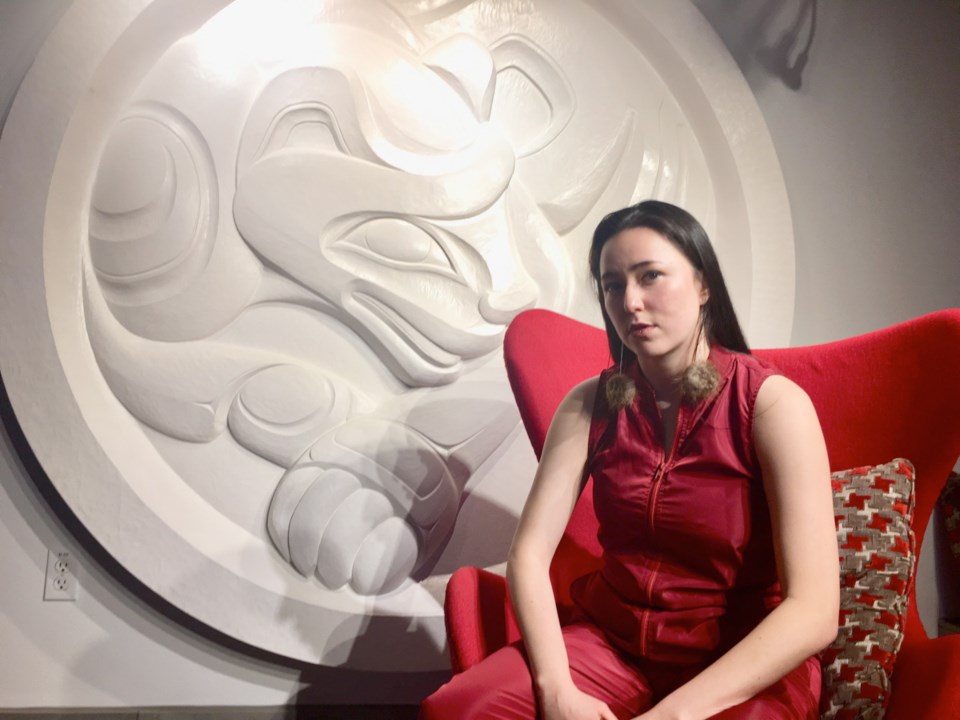I’ve been reading about Indigenous fashion as it pops up in the news, but I’ve never been able to experience it. Joleen Mitton is working to establish an Indigenous fashion week here in Victoria and I think that’s an exciting opportunity.
“Indigenous fashion is part of a slow-style craftsmanship; it’s very special,” said Mitton, a fashion producer of Cree and Blackfoot descent. “It can’t be made in a factory, it’s handmade and incorporates traditional materials.”
As I sat with Mitton, she showed me a high-fashion photo of a model wearing a wolf-fur jacket, then explained the fur was caught in a family trapline several decades ago.
“The fur is older than most people. Much of the materials used in Indigenous fashion are all traditional items that have been repurposed,” Mitton said, showing me other photos of items made out of moose tuft and beaver skin. “Indigenous fashion is very intentional and very cultural.”
This week, Mitton will be in Victoria producing the Ancestral Threads Fashion Show, showcasing the work of 18 Indigenous designers. I am excited to see a show like this coming to our region. This show is hosted through the Canadian Housing and Renewal Association’s national conference and, unfortunately, it is open only to conference delegates.
I would like to see Ancestral Threads or a similar show return to Victoria and be open to the public. I think it’s powerful to include Indigenous history with modern fashion. This is a demonstration of decolonization. To me, decolonization doesn’t mean reverting to the way things were before settlers arrived, it’s making space and changing how things are done to be more inclusive of Indigenous ideas and ways.
“I want Indigenous people to be proud and visible,” Mitton said. “Indigenous fashion is more than fashion, it includes healing, culture and ceremony.”
I understand that logistics play a role in all organized events, but I think we need to make space for people to be exposed to these types of cultural events. For the show at the association’s conference, Mitton partnered with Skwachàys lodge, which sponsored the event. Mitton is also a resident at the lodge, which offers affordable housing to artists through profits generated from its Indigenous boutique hotel rooms.
Mitton is looking for partners in hosting an Indigenous fashion week in Victoria. In 2017, she launched Vancouver Indigenous Fashion Week, a four-day event featuring nearly 30 Indigenous fashion designers and brought in 3,000 people on the first day at Laurel Park.
Mitton entered the fashion world when she was discovered standing in line waiting for a free smoothie at the age of 15. She started modelling and spent her late teens and early 20s modelling in Asia.
“This was before the time of Instagram, and you had to be discovered to be a model,” Mitton said.
In Asia, she experienced a new life modelling high-end brands and was featured on covers of magazines and on billboards. One day, Mitton noticed the magazines were saying she was half-Chinese, and that wasn’t true. Mitton spoke to her agent, who confirmed they had said she was Asian so she could make more money.
When Mitton returned home to Vancouver, she went through an identity crisis.
“I was a blank slate when I returned,” she said, explaining her appearance was all dictated by others during her modelling, and her Indigenous roots were suppressed.
On top of having her Indigenous identity denied in Asia, Mitton’s mother is a product of the ’60s Scoop, and she has always had gaps in her cultural knowledge and experiences.
Mitton moved away from the camera and began working with families and children living with trauma. She found a passion working with troubled youth, who reminded her of her younger self. She saw how the system was failing youth and particularly Indigenous youth and she felt compelled to start supporting youth aging out of care.
Today, Mitton continues to work with youth aging out of the foster-care system, and she works as a fashion-show producer. She is using her cultural pride and experience in the fashion industry to help showcase Indigenous fashion, Indigenous values and Indigenous heritage, hoping to be a role model for the youth she works with.
Charla Huber is the director of communications and Indigenous relations at M’akola Group of Societies.



